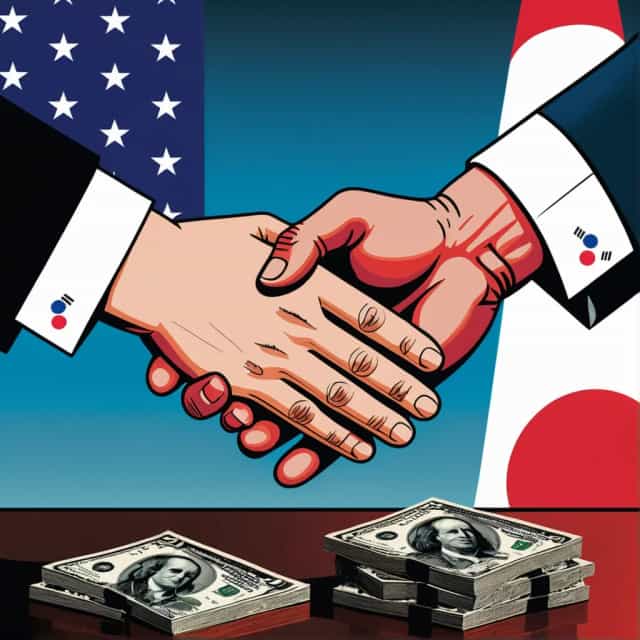
Image source: Block Media
KOSPI Breaks 3,700 Barrier, Sets Record High Amid Liquidity Optimism
The KOSPI index surged past the psychologically significant 3,700 mark during intraday trading, achieving an all-time high fueled by strong liquidity-driven momentum. The benchmark index climbed over 2%, with market capitalization exceeding 3,000 trillion won as investors anticipate a promising Q3 earnings season despite ongoing U.S.-China trade tensions.
At 9:25 a.m. on the 15th, the KOSPI was trading at 3,702.59, up 45.31 points (1.24%) from the previous day’s close, according to data from the Korea Exchange. The index began the session at 3,675.82, marking an 18.54-point (0.51%) jump from the previous close of 3,657.28 and quickly reached an intraday record before breaching the 3,700 level for the first time in history.
Liquidity and Policy Supporting Market Momentum
Economic analysts attribute the ongoing rally to global liquidity conditions and domestic fiscal policies aimed at boosting equity markets. Han Ji-young, a senior researcher at Kiwoom Securities, remarked, "Expectations for a supercycle in memory chips, coupled with governmental efforts to reallocate funds into equities, are underpinning the positive trajectory. Additionally, gains in U.S. markets, including the Philadelphia Semiconductor Index, indicate strong external market support for the KOSPI."
Investor patterns revealed robust net buying activity among retail and foreign investors, who purchased 34.5 billion won and 78.6 billion won worth of shares, respectively, in the main KOSPI market. Institutional investors, on the other hand, posted net selling of 91.9 billion won, highlighting divergent strategies among market participants.
Sector-wise gains were widespread but not uniform, with strong performances in transport equipment and parts (up 3.27%), warehousing and logistics (2.94%), and electronics (1.39%). However, metals (-1.79%), IT (-0.09%), and entertainment and culture (-0.97%) sectors lagged, reflecting varying sensitivities to evolving market conditions.
Trade Dynamics and Sector Rotation in Focus
Top KOSPI-listed companies demonstrated bullish movement during the trading session, with Hyundai Motor leading gains, up a striking 8.05%. Other notable performers included Samsung Electronics with a 1.47% increase and SK Hynix, up 2.13%. However, the session wasn’t universally positive for blue-chip stocks as Samsung Biologics edged down 0.44%.
A Kiwoom Securities analyst highlighted that recent comments from U.S. Treasury Secretary Janet Yellen suggest impending resolutions to critical trade negotiations between the United States and South Korea, expected within the next 10 days. These developments may ease tariff-related concerns impacting South Korean exports and drive further sector-specific rotation into automotive stocks, which remain highly sensitive to tariff discussions.
Cautionary observations were made concerning currency dynamics, with the Korean won hovering at 1,420 against the U.S. dollar. Analysts stress that further fluctuation in exchange rates could influence fund flows and potentially reshuffle investor sentiment across various sectors.
KOSDAQ Reflects Mixed Sentiment in Intraday Trading
While the KOSPI grabbed headlines with its historic rise, the KOSDAQ index exhibited more tempered and volatile activity. As of 9:25 a.m., the KOSDAQ traded at 863.66, a modest gain of 1.06 points (0.12%) from the previous session. The index had initially opened stronger, reaching 866.82, up 2.10 points (0.24%) compared to the prior close of 864.72, but was unable to sustain upward momentum, trending lower during mid-session trading.
Individual investors remained key drivers in the KOSDAQ market, with net purchases amounting to 168.4 billion won. In contrast, foreign and institutional investors adopted a bearish stance, recording net selling of 145.4 billion won and 8 billion won, respectively.
Sector strengths included transport equipment and parts (up 1.77%), metals (0.93%), and pharmaceuticals (0.38%). However, general services (-0.74%), publishing (-0.28%), and food, beverages, and tobacco (-0.24%) faced declines, mirroring broader diversification trends and cyclical pressure within mid-cap sectors.
Stable Currency Markets Provide Calm Amid Market Volatility
The Korean won-dollar exchange rate opened steady at 1,421.3 won, unchanged from the prior session’s closing figure. This stability offers a brief respite amidst highly fluid equity markets where currency shifts can significantly influence investment strategies and capital flows.
Within KOSDAQ’s market capitalization rankings, dynamics were similarly mixed. Standout gainers included EcoPro BM (up 3.67%), Samchundang Pharm (5.32%), and Pharma Research (6.01%). On the downside, losses were recorded by Peptron (-1.50%), Rainbow Robotics (-1.72%), and Alteogen (-0.67%). Investor activity in these stocks underscores the sector-specific movements within South Korea’s broader index trends.
Conclusion
The KOSPI’s historic breach of the 3,700 barrier underscores a liquidity-heavy market poised for continued growth, supported by favorable policy measures, positive semiconductor outlooks, and global market trends, despite persistent geopolitical uncertainties. Meanwhile, the KOSDAQ’s performance highlights ongoing volatility and mixed sectoral outcomes. As trade negotiations with the U.S. progress and exchange rates remain stable, investor focus will likely center around sector rotations and earnings reports heading into Q3.










